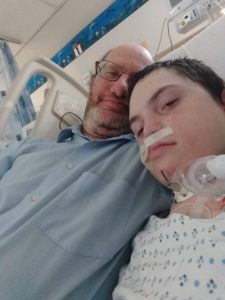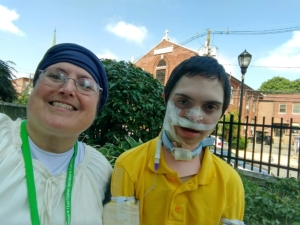Eleven parents of children with disabilities and Iowa disability rights groups have filed a federal lawsuit today challenging an Iowa law that bans school districts from imposing mask mandates in schools.
The parents and disability rights advocates are taking the action to protect children who are too young to be vaccinated whose disabilities, including underlying health conditions, make them particularly susceptible to severe illness, long haul COVID symptoms, or even death from COVID-19. They argue that the ban on mask mandates discriminates against these students in education, effectively excluding them from public schools and denying them equal access to education. That is a violation of the Americans with Disabilities Act (ADA) and Section 504 of the Rehabilitation Act.
Earlier this year, the Iowa Legislature passed House File 847. It prevents local school districts from requiring anyone to wear a face mask and was signed into law by Gov. Kim Reynolds.
The lawsuit filed today is asking the district court to block the provision of the law prohibiting mask requirements at school as a violation of federal law (ADA and the Rehabilitation Act) and to order the state to allow school districts to adopt mask mandates for their students and staff.
The clients in the case are The Arc of Iowa and 11 parents of minor children across the state with disabilities whose health could be at risk due to the enforcement of this provision.
They are represented by the American Civil Liberties Union, the ACLU of Iowa, Disability Rights Iowa, The Arc of the United States, the Arnold & Porter law firm, and the Duff Law Firm, P.L.C.
Charmain Alexander of Urbandale is one of the clients in the lawsuit. Her son, Corban, has asthma. “I am doing this to help create a safe environment not only for my own child but for all children, including those with disabilities and other conditions. You would think that schools would make the safety of their students their top priority, but unfortunately, that is not happening because of this law.
“It’s important that children have the opportunity to learn in person. I think most parents have seen that over the last year. But what are you supposed to do when you’re in my position and are afraid that if you send your child to school so that they can keep up with their education, you’re afraid that the worst might happen?”
Another client, Heather Preston of Des Moines has two school-age children. One has a rare organ disorder, which her doctor has advised her puts him at risk for serious illness if he contracts COVID.
“I know that a parent can’t protect their child from all things, but they have a responsibility to protect them from serious safety threats. And for my son, going to a school where not everyone is wearing masks puts him at huge risk. Meanwhile, because of his needs, he needs to be learning in person.
“It’s terrifying for a parent to have to worry every day about the physical safety of their child, and to have to choose between their child keeping up with their education and their child becoming seriously ill, or perhaps even dying. That’s a choice no parent should have to make. I want my children to come home safe from school.”
ACLU of Iowa Legal Director Rita Bettis Austen said, “HF 847 is a civil rights violation that puts vulnerable kids in a dangerous situation. We all should be able to agree that it’s not fair to force kids out of school because they have health conditions and disabilities that put them at a higher risk of serious complications from COVID. It’s also not fair to require parents to expose their children to these risks just so they can go to school. We are asking the court to block HF 847 so that our schools will be able to require masks when necessary to ensure an equal education for all kids.
Susan Mizner, director of the ACLU’s Disability Rights Program, said, “Prohibiting schools from taking reasonable steps to protect the health of their students forces parents to make an impossible choice: their child’s education or their child’s health. Students with health conditions or disabilities that make them vulnerable to COVID have a right to attend school without endangering their health or safety. Schools who have children with these conditions have legal obligations under federal disability rights laws.”
“Under the Americans with Disabilities Act and Section 504 of the Rehabilitation Act, public schools cannot exclude students with disabilities nor deny them equal access to their education or segregate them unnecessarily. Schools are obligated to provide reasonable modifications to policies, practices, and procedures in order to give students with disabilities an equal opportunity to benefit from their public education,” Mizner said.
“The COVID-19 pandemic has not absolved Iowa schools from these requirements, and Iowa officials cannot waive these obligations for them,” Mizner said.
Doug Cunningham, Executive Director of The Arc of Iowa, an advocacy organization for people with intellectual and developmental disabilities, said, “This should not be a political issue. It’s an issue that affects the health and wellbeing of the children with disabilities in our state, and I would like to think that all political groups embrace that basic principle.”
“This law is making it impossible for many students to go to school. I see first-hand how families have to make an awful choice—the health or safety of their child or their education. Being safe at school is a right. Getting an education is a right. I’m hopeful this lawsuit will correct this terrible situation that our state government is creating for nearly any family in the state who has a school-aged child with a condition threatened by COVID,” Cunningham said.
Catherine (pronounced kath-REEN) E. Johnson, Executive Director of Disability Rights Iowa, said, “Excluding students with disabilities from public education was routine practice prior to Congress enacting federal protections. For more than 40 years, students with disabilities have been protected from discrimination based on disability by Section 504 of the Rehabilitation Act and the Americans with Disabilities Act. These federal laws guarantee students with disabilities the right to equal access to a public education alongside their general education peers. HF 847 effectively excludes students with disabilities from public education and denies them equal access, in violation of the Americans with Disabilities Act and Section 504 of the Rehabilitation Act. We request the court block HF 847 so that public schools can comply with their obligations under Section 504 of the Rehabilitation Act and the Americans with Disabilities Act, and restore our students with disabilities civil rights to equal access to education.”
Other clients have also provided statements:
Erin Vercande of Decorah has a child who has cerebral palsy as well as epilepsy and has strokes.
“COVID has hit the community of disabled children and their families especially hard. My son loves school. He loves his classmates, teachers, associates, and therapists. He loves and needs the stimulation from the other children at school and all the fun things he gets to participate in. But he’s at risk of serious illness if he gets COVID,” Vercande said.
“With the mask mandate ban this year and other factors within our school district, my son is currently unable to attend school. The mask mandate ban is in direct violation of precautions recommended by his doctors for him to be able to attend school safely. My son has a legal right to go to school. Our state is denying him, and others like him, that right. My son doesn’t have a voice to fight for his rights. But I do. And I will fight for him and all the other children like him that are being denied that right.”
Jonathan Craig, a Waterloo father of four children impacted by the ban, said, “Every child deserves an education in a safe environment. As the father of four children, two of whom are immunocompromised and have chronic illnesses, I’ve seen first-hand the devastating effects of what happens when children are not afforded their right to a safe and equitable public education,” Craig said.
“Because masks aren’t allowed to be required in public schools in Iowa this year, our pediatrician recommended that all four of our children, who are too young to be vaccinated, stay home and learn through virtual learning, as contracting COVID-19 would be life-threatening to our family,” Craig said.
“Because of my daughter’s physical and developmental disabilities, she isn’t able to engage with virtual learning and we’re heartbroken to watch her fall through the cracks. We’ve seen our son (who has worked incredibly hard to overcome his own learning difficulties) flourish during his years of in-person schooling but he has fallen behind academically and socially since learning behind a screen for eight hours a day,” he said.
“If school districts could mandate masks the way they were able to last year, it would give kids like mine the chance to have an equitable educational opportunity and we could make the best decisions for our family’s health,” Craig said.
The complaint can be found here.










 I live in Silver Spring, Maryland. I am on the autism spectrum and have anxiety, ADD, seizures, and a learning disability. I am writing to talk about the importance of helping people with disabilities get their student loans discharged, including ending the 3 year monitoring period. As the Biden Administration works to address student loan debt for people with disabilities, it is critically important that the application process be easier and we eliminate the 3 year monitoring period for work earnings. Student loans create a major financial hardship on people like me and many others with disabilities, especially those who live on their own in expensive areas. The amount of loans that I had discharged was around $1,177 which is just slightly less than what I pay in monthly rent for my studio apartment. No one with a disability should have to choose between paying for rent or basic needs and student loans. Many of us in the disability community struggle with finding jobs that pay livable wages where we make enough to live comfortably off public benefits. Benefit cliffs often force us to make big trade-offs between working and needing to stay eligible for public benefits. Some people with disabilities have their Social Security benefits cut to pay their student loans and that isn’t fair.
I live in Silver Spring, Maryland. I am on the autism spectrum and have anxiety, ADD, seizures, and a learning disability. I am writing to talk about the importance of helping people with disabilities get their student loans discharged, including ending the 3 year monitoring period. As the Biden Administration works to address student loan debt for people with disabilities, it is critically important that the application process be easier and we eliminate the 3 year monitoring period for work earnings. Student loans create a major financial hardship on people like me and many others with disabilities, especially those who live on their own in expensive areas. The amount of loans that I had discharged was around $1,177 which is just slightly less than what I pay in monthly rent for my studio apartment. No one with a disability should have to choose between paying for rent or basic needs and student loans. Many of us in the disability community struggle with finding jobs that pay livable wages where we make enough to live comfortably off public benefits. Benefit cliffs often force us to make big trade-offs between working and needing to stay eligible for public benefits. Some people with disabilities have their Social Security benefits cut to pay their student loans and that isn’t fair.








